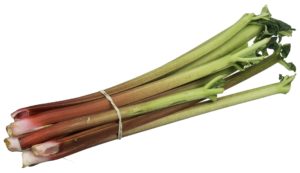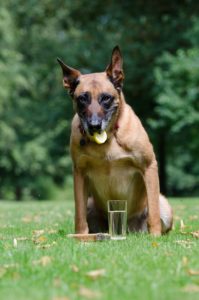Safe or Not? 60+ Foods that are Bad for Dogs

If dogs have one thing mastered, it’s the art of begging. They each have their own perfected version of puppy dog eyes and whines that make our hearts melt. While every owner is different when it comes to giving their dog human food, it leaves the question: what foods are actually okay for our dogs to eat? We toss down little “treats” without questioning whether or not they’re actually okay for our pups and are caught off guard when they become sick.
Below is a list of over 60 human foods that are bad for dogs. If you happen to find a food that your dog has eaten before, don’t fret—call your vet and see what actions you need to take, just in case.
1. Candy, Gum, Toothpaste, Diet Foods
You may be wondering—why are these grouped together? Simple. All of these “food” items contain a special ingredient called xylitol. It’s used as a sweetener, but it’s not so sweet for your dog. It can lower their blood sugar and can cause liver failure within days if it’s ingested. Look for signs of vomiting, lethargy, coordination problems, and possible seizures.
2. Avocado
This fruit (yes, it’s technically a fruit!) it has persin, a fungicidal toxin that acts as a fatty acid. Too much can lead to vomiting and diarrhea, so it’s wise to just keep it away from wandering paws.
3. Onions, Garlic, and Chives
These three foods are grouped together because they have the same effects on dogs. They kill red blood cells, which can cause anemia, and can be considered poisonous in large doses. If ingested, look out for signs of weakness, vomiting, and breathing problems. Also, keep in mind that dehydrated and powder forms of these foods will cause the same problems!
 4. Coffee, Tea, Cocoa and Chocolate
4. Coffee, Tea, Cocoa and Chocolate
Caffeine, whether it’s in the form of coffee, tea, or chocolate, can be detrimental to your dog. These foods contain methylxanthines, an extract found in cacao beans. Coffee, tea, cocoa, and chocolate can cause your dog to experience vomiting, diarrhea, panting, excessive thirst and urination, hyperactivity, tremors, seizures, and possible death.
5. Pain Killers and Cold Medicine
While this could hardly be considered as food, you may be tempted to give your pet medicine if they seem sick to you. Refrain from this and consult your vet about over-the-counter drugs for your dog. While some may be okay, there are ingredients such as acetaminophen or ibuprofen that can be potentially deadly.
6. Grapes and Raisins
These foods are not okay for your dog, contrary to popular belief. They can cause kidney failure and consistent vomiting, as well as mood changes.
7. Milk, Cheese, and Ice-Cream
Dairy products in general, including milk and ice-cream can cause serious digestive problems for your pup and can result in him/her having diarrhea. In some cases, your dog may have an allergy to it as well, which may cause them to itch.
8. Macadamia Nuts
These can cause serious problems for your dog that can last up to 2 days, depending on how much was ingested. Symptoms can include vomiting, weakness, depression, tremors, and hyperthermia.
9. Fat Trimmings and Bones
Cooked and uncooked, fat trimmings can cause pancreatitis and if ingested, bones can splinter and make cuts within your dog’s digestive system.
 10. Permissions, Peaches, Plums, Apricots, Apples, and Cherries
10. Permissions, Peaches, Plums, Apricots, Apples, and Cherries
These foods may seem odd, but the real worry is within their seeds which contain cyanide. Cyanide is poisonous to both dogs and humans. Additionally, pits within these fruits have the possibility of becoming stuck within their digestive system.
11. Chips and Pretzels
These two foods go together because they have something in common: High salt content. Salt in general can be detrimental to your dog’s health. In addition to extreme thirstiness and urination, it can cause vomiting, diarrhea, depression, tremors, fevers, seizures, and in extreme cases, death.
12. Yeast Dough
Yeast dough can rise within your pet’s stomach, causing gas within their digestive system. This can lead to bloating and possible twisting of the stomach, which can become life-threatening.
13. Baking Powder and Baking Soda
Just like yeast dough, these two ingredients are leavening products that can cause your dog to have gastrointestinal issues. It can cause spasms, seizures, and even heart problems.
14. Nutmeg
This spice has a compound known as myristicin which can be deadly to dogs in large doses. If it’s ingested, your dog may face problems such as hallucinations, disorientation, high blood pressure, dry mouth, abdominal pain, and seizures.
The leaves, rather than the stem, are the ones to keep away from your pet. They can be deadly to your pets and can cause symptoms such as vomiting, weakness, lethargy, bloody urine, and tremors.
16. Cinnamon
Although cinnamon is not exactly toxic to dogs, it can cause problems. Not only will it cause irritation to the inside of your dog’s mouth, but it can also lower their blood sugar and can lead to diarrhea, vomiting, and possible liver disease.
17. Tomatoes and Potatoes (Stems, Leaves and Skins)
Keep your pup away from green or unripe tomatoes or potatoes and their leaves. A toxin known as solanine can cause gastrointestinal distress, weakness, lethargy, confusion, and weakness.
18. Almonds, Pecans, and Walnuts
Nuts in general have high amounts of oil and fat. This can cause vomiting, diarrhea, and potentially pancreatitis within your pet.
19. Raw Eggs
This is widely used by owners who want their dogs to have a raw diet, but it’s been largely debated on whether or not it’s actually safe for our pets. Just like with humans, there’s a chance for food poisoning like Salmonella or E. coli.
While it may seem silly that this is listed on here, it’s still important to know. Alcohol can affect the brain and the liver of your dog, just like it does for humans—except it takes a lot less. It can cause diarrhea, vomiting, coordination problems, breathing problems, comas, and, in worse cases, death.
21. Raw Fish and Raw Meat
Just like raw eggs, raw fish and meat have bacteria that may cause food poisoning. There are specific types of fish like salmon, shad, trout, and sturgeon that can cause certain diseases. The first visible signs are vomiting, fever, and large lymph nodes.
22. Coconut and Coconut Oil
These aren’t as dangerous to your pet, but they may give your dog an upset stomach and/or diarrhea. Additionally, coconut water is very high in potassium and should not be given to your pet.
23. Popcorn
Although plain popcorn can be given to your dog in small amounts, most popcorn that people like to enjoy has a large sodium and fat content, which can result in dehydration and obesity (in the long-run). Also, the un-popped kernels can hurt your pup’s teeth and gums if left unchecked.
24. Chamomile
While this can be used to help your dog with an upset stomach or a mild skin irritation, overdosing can cause serious problems (as well as doing it for a long period of time). If your dog does encounter chamomile poisoning, he/she may experience a range of symptoms depending on how much was ingested. If was a small dose, it may just be an upset stomach but a large dose could lead to internal bleeding. If you have any questions, consult your vet about whether or not chamomile is ultimately safe for your dog.
25. Mustard Seeds
Mustard seeds have complex compounds that can be toxic to dogs, so make sure to keep them out of reach, including any foods that may have mustard seed in them. Symptoms usually include vomiting and diarrhea, but if it seems they are feeling worse than that, contact your vet.
Citrus fruit in its entirety (stems, leaves, peels, fruit, and seeds) contain varying amounts of citric acid and oils that can irritate your dog’s skin and affect their nervous system by making them depressed. If they happen to eat small doses of the actual fruit, your pet may face minor stomach upset as well.
27. Licorice
Licorice plant is highly toxic to dogs and even though the candy doesn’t actually contain the toxicity, it is still full of sugar and can affect your dog’s teeth and their weight. Look for symptoms of vomiting, diarrhea, and lethargy.
28. Marijuana
It’s largely debated whether or not weed is good or bad for your dogs—there are even products that you can buy that have medicinal marijuana in them! But always ask your vet whether or not it may be smart to introduce your dog to these methods. However, if your dog encounters marijuana in a different situation, the toxicity of the plant can cause them to have symptoms of dribbling urine, low heart rate, low blood pressure, and the inability to stand straight or walk right.
29. Hops
If you’re brewing beer at home, make sure to keep your hops away and out of sight for your pet. The exact toxin is unknown, but if your dog ingests hops it may result in malignant hyperthermia, increased breathing, vomiting, and in some cases, death.
This goes without saying, but sugar overall is unhealthy for your pup. It can cause obesity, diabetes, and can affect their teeth. It’s better to just keep it away.
31. Bacon
You may think bacon is just fine—it’s cooked right? While it may be cooked, bacon has an incredible amount of salt and fat which can cause your dog to have an upset stomach. In large amounts, it can give your dog pancreatitis!
32. Tumeric, Paprika, and Pepper
These spices contain a little ingredient called capsaicin, which can cause your dog to have skin irritation and stomach issues!
33. Flaxseed
Flaxseed isn’t exactly toxic for your dog if given in appropriate quantities (consult your veterinarian before attempting to give your dog flaxseed)—it can actually be beneficial. However, if your dog happens to overdose on flaxseed, it can become toxic and he/she may experience symptoms of vomiting, diarrhea, weakness, trouble walking, seizures, and possible paralysis.
34. Corn On The Cob
Corn on the cob is a problem mainly because it can cause obstruction problems for your dog. However, if your dog manages to eat it, look out for symptoms of vomiting, stomach pain, and loss of appetite.
35. Watermelon Seeds and Rinds
While watermelon itself is okay for your dog, the seeds can cause intestinal blockage and the rinds can give them gastrointestinal issues. Make sure to remove them before giving the watermelon as a healthy treat!
While this is a fairly comprehensive list of major foods that may cause harm to your pet, make sure to carefully consider any food you give your dog. Take measures to ensure that they won’t encounter any of the foods that are listed above—it will save you from worrying too much. That being said, dogs can be extremely curious so if an accident does happen, make sure to watch for any outstanding symptoms and take a trip to the vet if necessary. There are other foods you can spoil your dogs with, but always make sure they’re safe and nutritionally healthy for them—it’s a win-win situation!




